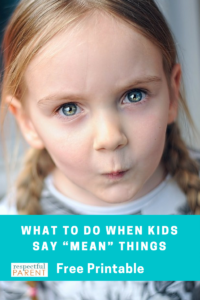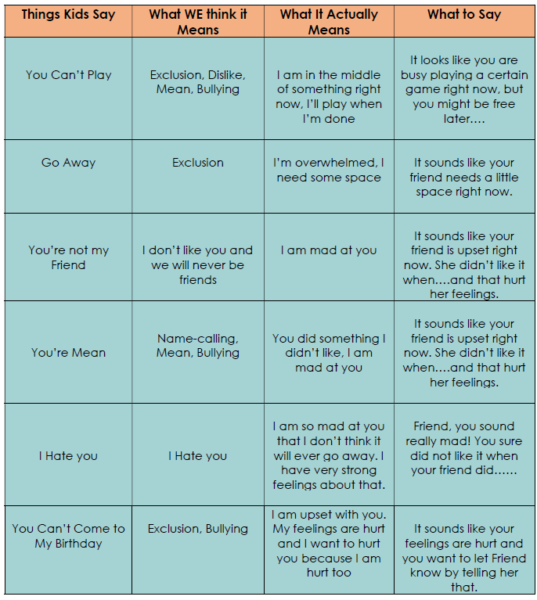
Anytime there is a group of children on a playground or schoolyard you will inevitably hear kids say a slew of “mean” things, “You can’t play!” “You’re not my friend!” “Go away!” “You’re mean!” “I hate you!”
These things can be hard to hear, especially if you are the parent of the “victim” or “offender.” We don’t want our child hurting someone else, and we certainly don’t want our child hurt.
Figuring out how to handle these situations can be challenging because they so easily trigger our own moral compasses. However, when we take our own morality out of it, the kids are actually doing some pretty healthy things.
Things kids say, to the untrained ear, sound mean, rude, and even exclusionary. In reality, these things are developmentally normal ways of learning to set boundaries. They are more crude and rudimentary because they are just learning how to communicate; their brains are not fully developed yet.
The good news is when children get a chance to practice conflict – when they get their feelings hurt or unknowingly hurt another’s feelings, they have been given the gift of a step towards maturity, effective communication and problem-solving. When conflict plays out without interference, amends are often made and relationships are repaired on their own.
When children see how their words or actions affect another, a building block of empathy is built and they have the chance to reflect – becoming more self-aware. In short, kids can’t learn how to manage conflict, without actually having conflict. Conflict takes practice and lots of it.
Take a Fresh Look
Looking at these “insults” through this lens we can see these situations as the emergence of healthy conflict. When conflicts are shut down prematurely, when children are called mean, disrespectful or rude, they learn that conflict is bad or wrong and should be avoided, especially around people in positions of authority.
Intervening can position the adult as the person to run to because they know they will dole out punishments, or solve the problem for them by telling them what to do – this often unintentionally creates tattling. Children learn to use the adult as a way to gain favor in the situation.
Thomas Gordon once said “The only two people who can solve a problem in a relationship are the people ‘in’ the relationship” so when adults try to solve, they usually end up making things worse. Since all behavior meets some sort of need, our job as parents is to try and understand what that behavior is trying to tell us, not to be the judge and jury. When we are able to do this, children will learn that setting boundaries is healthy, that conflict and struggle are a normal part of life – not scary or bad.
What can we do instead when these problems arise? We can wait and see how it plays out and if it becomes necessary to help, we can do it in an objective way, by listening and then reflecting back each child’s point of view, according to both Parent Effectiveness Training’s Active Listening and RIE’s Sportscasting. This helps the child gain a broader perspective of the situation and leads to problem-solving. Here are a few examples and a Free Printable of “child speak” and what they often mean to get you started:

What Mean Things Sound Like
“YOU CAN’T PLAY!”
What it Really Means: I am busy playing this game with my other friend right now. I will play with you later.
What to Say:
Adult: It sounds like Sara is in the middle of playing a game with Jackie right now and is not finished.
Sara: Yes, we are playing ninjas right now.
Adult: I see, they are in the middle of a game. It looks like you are really wanting to play with them and are a little sad they told you no.
Jackie: Nods
Sara: Well, she can play when we are done.
Adult: Sara’s saying they are busy now, but you can play when they are done
Jackie: (to Sara): Ok, how long will that be?
Sara: Not long, we are almost done, I’ll come get you in a few minutes.
“YOU’RE NOT MY FRIEND!”
What it Really Means: I am mad at you!
What to Say:
Adult: You sound really mad at Josh right now!
Brian: Yes, he cut in front of me in line and is pushing me!
Adult: You don’t like it at all that he cut in front of you like that.
Brian: No! Now I will have to wait longer and he is squishing me!
Josh: Moves back behind Brian, giving him some space.
Adult: Brian moved back, looks like he didn’t know that really bothered you.
Brian: Relaxes and smiles.
“GO AWAY!”
What it Really Means: I need some space right now, I’m mad at you, I am overwhelmed.
What to Say:
Adult: Looks like you’re needing to be left alone right now.
Bruce: YES! I’m almost finished with my building!
Adult: You are concentrating hard and don’t want anyone to knock it over.
Bruce: Right! It’s the second time I’ve built it because Charlotte knocked it over the first time walking by and Adam is always knocking things over.
Adult: You are worried Adam will knock it over.
Adam: I won’t jeez, I was just wanting to see.
Bruce: You can look, but not until I’m all done.
Adam: Fine, I’ll stand way back until you are done.
That is how simple it is to ‘help’ when children have conflict. You don’t take sides, you just listen and they solve it themselves when we just let them.
Here is a printable for your fridge, just in case you need a quick reference 😉
What things your kids say that drive you nuts? Share in the comments, I just might write about it!
If arguing or sibling struggles are a problem, you might also like:
Secretes to Sorting Sibling Squabbles – Larissa Dan
Sibling Rivalry – 5 Common Mistakes Parents Make – Kate Russell
One Surefire Way Your Kids Can Problem Solve and Get Along – Respectful Parent
Thank you to Lisa Sunbury Gerber for your support in writing this.


[…] When Kids Say Mean Things […]